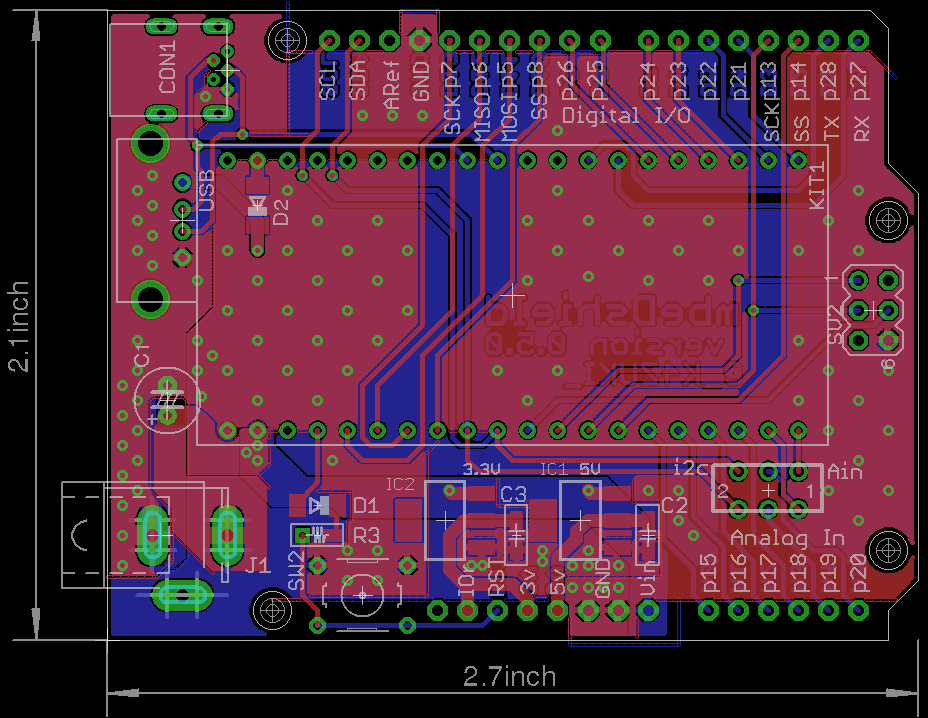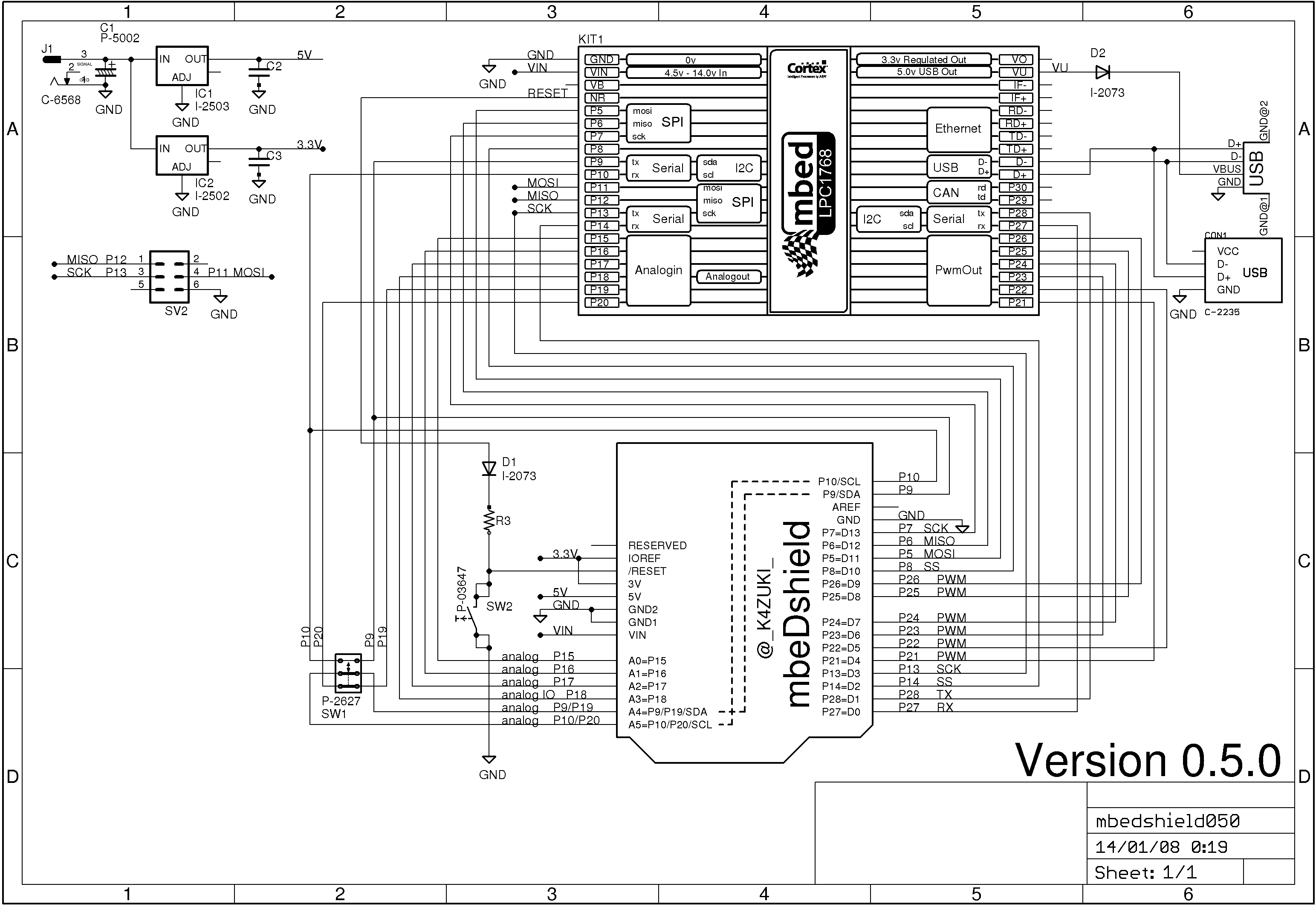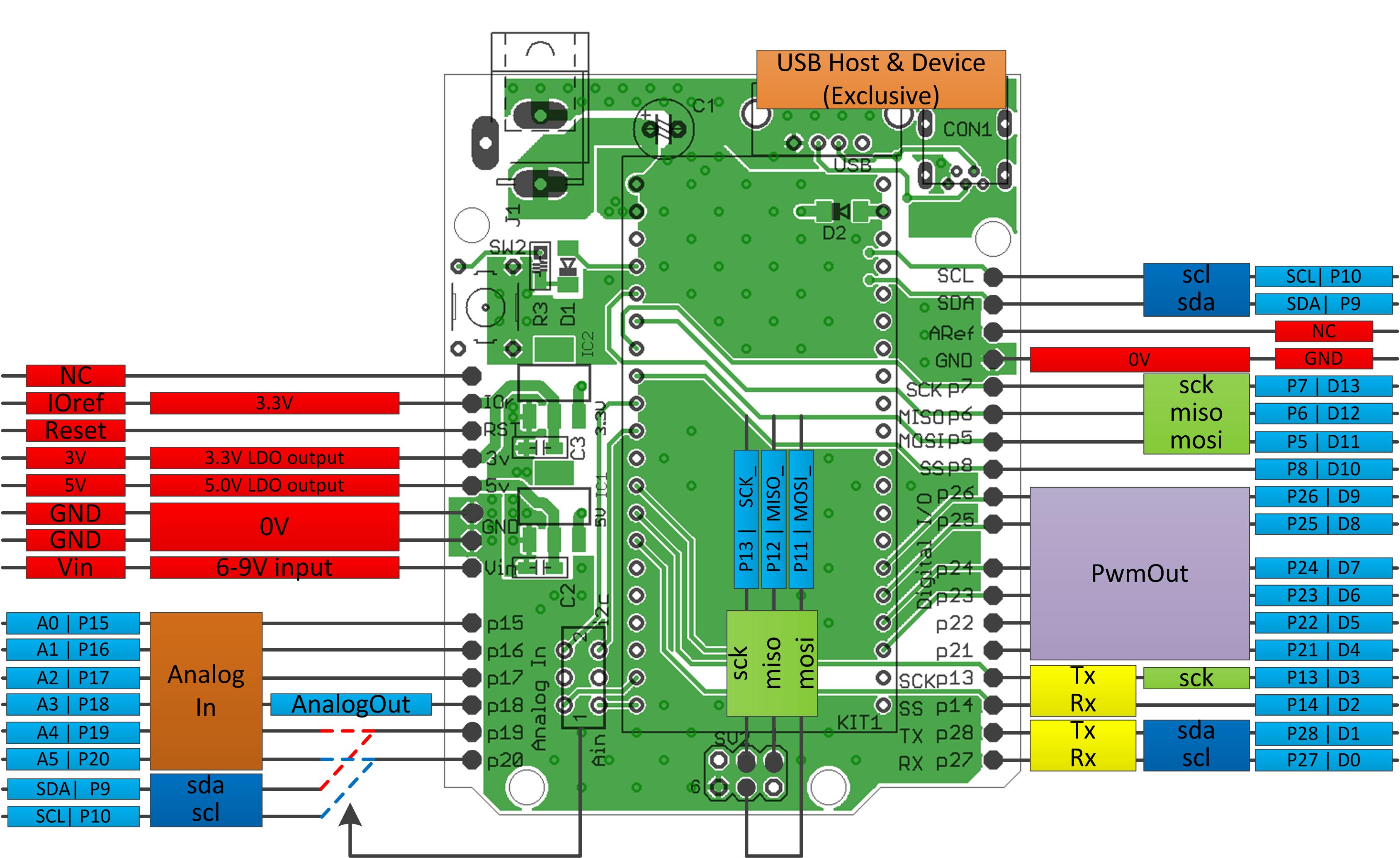The official mbed C/C SDK provides the software platform and libraries to build your applications.
Fork of mbed by
(01.May.2014) started sales! http://www.switch-science.com/catalog/1717/
(13.March.2014) updated to 0.5.0
This is a pin conversion PCB from mbed 1768/11U24 to arduino UNO.
- So if you have both mbed and arduino shields, I guess you would be happy with such a conversion board :)
Photos
- Board photo vvv

- Schematic photo vvv

- Functionality photo vvv

Latest eagle files
PCB >> /media/uploads/k4zuki/mbedshield050.brd
SCH >> /media/uploads/k4zuki/mbedshield050.sch
BIG changes from previous version
- Ethernet RJ45 connector is removed.
- http://mbed.org/components/Seeed-Ethernet-Shield-V20/ is the biggest hint to use Ethernet!
MostALL of components can be bought at Akizuki http://akizukidenshi.com/- But sorry, they do not send parts to abroad
- Pinout is changed!
| arduino | 0.4.0 | 0.5.0 |
|---|---|---|
| D4 | p12 | p21 |
| D5 | p11 | p22 |
| MOSI_ | none | p11 |
| MISO_ | none | p12 |
| SCK_ | none | p13 |
This design has bug(s)
- I2C functional pin differs between 1768 and 11U24.
Fixed bugs here
- MiniUSB cable cannot be connected on mbed if you solder high-height electrolytic capacitor on C3.
- http://akizukidenshi.com/catalog/g/gP-05002/ is the solution to make this 100% AKIZUKI parts!
- the 6-pin ISP port is not inprimented in version 0.4.0
it will be fixed in later version 0.4.1/0.4.2/0.5.0This has beenfixed
I am doing some porting to use existing arduino shields but it may faster if you do it by yourself...
you can use arduino PinName "A0-A5,D0-D13" plus backside SPI port for easier porting.
To do this you have to edit PinName enum in
- "mbed/TARGET_LPC1768/PinNames.h" or
- "mbed/TARGET_LPC11U24/PinNames.h" as per your target mbed.
here is the actual list: This list includes define switch to switch pin assignment
part_of_PinNames.h
USBTX = P0_2,
USBRX = P0_3,
//from here mbeDshield mod
D0=p27,
D1=p28,
D2=p14,
D3=p13,
#ifdef MBEDSHIELD_050
MOSI_=p11,
MISO_=p12,
SCK_=p13,
D4=p21,
D5=p22,
#else
D4=p12,
D5=p11,
#endif
D6=p23,
D7=p24,
D8=p25,
D9=p26,
D10=p8,
D11=p5,
D12=p6,
D13=p7,
A0=p15,
A1=p16,
A2=p17,
A3=p18,
A4=p19,
A5=p20,
SDA=p9,
SCL=p10,
//mbeDshield mod ends here
// Not connected
NC = (int)0xFFFFFFFF
Diff: AnalogIn.h
- Revision:
- 43:e2ed12d17f06
- Parent:
- 27:7110ebee3484
- Child:
- 44:24d45a770a51
--- a/AnalogIn.h Wed Aug 29 12:44:47 2012 +0100
+++ b/AnalogIn.h Fri Oct 26 17:40:46 2012 +0100
@@ -16,67 +16,62 @@
namespace mbed {
-/* Class: AnalogIn
- * An analog input, used for reading the voltage on a pin
+/** An analog input, used for reading the voltage on a pin
*
* Example:
- * > // Print messages when the AnalogIn is greater than 50%
- * >
- * > #include "mbed.h"
- * >
- * > AnalogIn temperature(p20);
- * >
- * > int main() {
- * > while(1) {
- * > if(temperature > 0.5) {
- * > printf("Too hot! (%f)", temperature.read());
- * > }
- * > }
- * > }
+ * @code
+ * // Print messages when the AnalogIn is greater than 50%
+ *
+ * #include "mbed.h"
+ *
+ * AnalogIn temperature(p20);
+ *
+ * int main() {
+ * while(1) {
+ * if(temperature > 0.5) {
+ * printf("Too hot! (%f)", temperature.read());
+ * }
+ * }
+ * }
+ * @endcode
*/
class AnalogIn : public Base {
public:
- /* Constructor: AnalogIn
- * Create an AnalogIn, connected to the specified pin
+ /** Create an AnalogIn, connected to the specified pin
*
- * Variables:
- * pin - AnalogIn pin to connect to
- * name - (optional) A string to identify the object
+ * @param pin AnalogIn pin to connect to
+ * @param name (optional) A string to identify the object
*/
- AnalogIn(PinName pin, const char *name = NULL);
-
- /* Function: read
- * Read the input voltage, represented as a float in the range [0.0, 1.0]
+ AnalogIn(PinName pin, const char *name = NULL);
+
+ /** Read the input voltage, represented as a float in the range [0.0, 1.0]
*
- * Variables:
- * returns - A floating-point value representing the current input voltage,
- * measured as a percentage
+ * @returns A floating-point value representing the current input voltage, measured as a percentage
*/
- float read();
+ float read();
- /* Function: read_u16
- * Read the input voltage, represented as an unsigned short in the range [0x0, 0xFFFF]
+ /** Read the input voltage, represented as an unsigned short in the range [0x0, 0xFFFF]
*
- * Variables:
- * returns - 16-bit unsigned short representing the current input voltage,
- * normalised to a 16-bit value
+ * @returns
+ * 16-bit unsigned short representing the current input voltage, normalised to a 16-bit value
*/
unsigned short read_u16();
#ifdef MBED_OPERATORS
- /* Function: operator float
- * An operator shorthand for <read()>
+ /** An operator shorthand for read()
*
- * The float() operator can be used as a shorthand for <read()> to simplify common code sequences
+ * The float() operator can be used as a shorthand for read() to simplify common code sequences
*
* Example:
- * > float x = volume.read();
- * > float x = volume;
- * >
- * > if(volume.read() > 0.25) { ... }
- * > if(volume > 0.25) { ... }
+ * @code
+ * float x = volume.read();
+ * float x = volume;
+ *
+ * if(volume.read() > 0.25) { ... }
+ * if(volume > 0.25) { ... }
+ * @endcode
*/
operator float();
#endif
